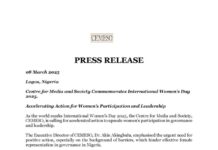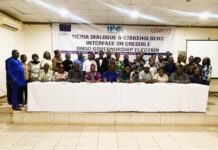
It is not only in Nigeria that a politician would switch political support from one political party to another. However, while this phenomenon is an isolated case in the settled democratic nations of the world, the scale of its occurrence in our nation is baffling. It can only be in Nigeria that 20 or more federal elected politicians would be defecting from one political party to another for no serious reasons other than personal interests.
The constitution would have to be revisited in order to bring clarity to how defecting from one political party to another would affect the status of an elected politician. This madness can be contained and sanity injected into the polity if a defecting politician were made to resubmit himself or herself for another election in his or her constituency in order to ascertain the endorsement of constituents in the change they have made, although this would be at the expense of public resources. There might also be sanity in the polity if our politics has developed to such a stage that it is no big issue that a politician has shifted political loyalty, with the electorate seeing such a decision as personal and of no consequence to others.
However, the migration of key politicians from one party to another has serious implications for electoral outcome in our type of polity. The failure of Goodluck Jonathan to win the 2015 presidential election can hardly be explained outside the exodus of key politicians from his Peoples Democratic Party in 2013. That exodus from the PDP to the All Progressives Congress included five serving governors and several elected senators and members of the House of Representatives. When these key politicians turned their backs against erstwhile Jonathan, it was only a matter of time that the final chapter of his presidential career would be concluded. The rift in the PDP was brought about by the disagreement over the leadership style of the then party chairman, Alhaji Bamanga Tukur.
More significantly, the rift escalated to ethno-regional disagreement over the ambition of Jonathan to continue with a presidency which was believed should have shifted to the North based on the zoning and rotational agreements within the PDP. With the exemption of Rotimi Amaechi, erstwhile governor of Rivers State who had personal feud with Jonathan and his wife, Dame Patience Jonathan, the governors and key politicians who defected from the PDP to the APC were mainly from the north. They represented the sentiments and emotions of their supporters and this showed in the massive support given to Muhammadu Buhari, candidate of the rival APC in the 2015 presidential election.
Of course, Buhari has always been a cult figure in the north. Arguably, he has been the most accepted northern politician since the late revered Sir Ahmadu Bello. However, there has been noticeable defections from his party to the PDP, mostly by those who migrated from that party to boost his presidential credentials in 2015. These defectors, just as in the pre-2015 presidential election, have been mostly from the north, the main political base of Buhari. The key defectors include former Vice President Atiku Abubakar, Senate President Bukola Saraki and Governor Aminu Waziri Tambuwal of Sokoto State, among other prominent politicians. It is a matter of wait and see how these defections will affect the electoral fortunes of Buhari in 2019.
The defection of the Governor of Benue State, Samuel Ortom, from the APC to the PDP seems to enjoy the blessings of his people, not least because of the killings in the state linked to herdsmen who are believed to be ethnic affiliates of Buhari. A somewhat lacklustre approach has not helped the cause of Buhari in this matter. However, the reported resignation of more than 250 aides of Governor Tambuwal- aides that are said to have remained loyal to Buhari and his APC- tends to suggest that the impact of defections might not be as devastating to the re-election of Buhari in 2019 as it was to that of Jonathan in 2015.
It has been suggested by no less a person than Asiwaju Bola Ahmed Tinubu, national leader of the APC that the reason for the defection of key politicians from his party to the PDP was because of the presidential ambitions of those key defectors. Tinubu will not be receiving a special medal for that suggestion, being one suggestion that is in the lips of every Dick and Harry. The most ardent supporters of Buhari would even insinuate that the main cause of their defection was because there was no more money to share as was allegedly the case in the previous dispensation. Be that as it may, Buhari has indicated an intention to seek re-election and many chieftains of his party have endorsed that position. It would appear from that intention of his that the ambitious ones within the APC would have to migrate elsewhere to fulfill their own presidential dreams. It is an open secret that Atiku has never hidden his ambition to be president and those of Saraki and Tambuwal, among others, have equally been evident…
There appears to be something of a national consensus, in the context of an informal rotation of power, that the presidency would revert to the south in 2023. This further explains why ambitious politicians from the north cannot be patient with incumbent Buhari to complete his putative second term in that year, and it also explains why Atiku has been telling whoever cared to listen that he would be president for only one term.. It can hardly be disputed that it could be an issue in some southern constituencies that the north would be holding on to political power for another eight years.
Prospective presidential aspirants, especially from the PDP, have been visiting the homes of influential former leaders, Olusegun Obasanjo and Ibrahim Babangida, in particular. In his characteristic diplomatic ways of wanting to please everyone, Babangida has been endorsing virtually every aspirant that solicited his support. But it would be the support of ordinary Nigerians that matters most in all of this. With the primaries of the major political parties still to come, Nigerians cannot wait enough for the dramas to unfold. It should be interesting how the horde of presidential aspirants within the gargantuan Peoples Democratic Party sort themselves out, with defectors challenging for the right to fly the flag of the party in competition with aspirants who had remained faithful to the party through thick and thin. The politically-interesting days have yet to come.















